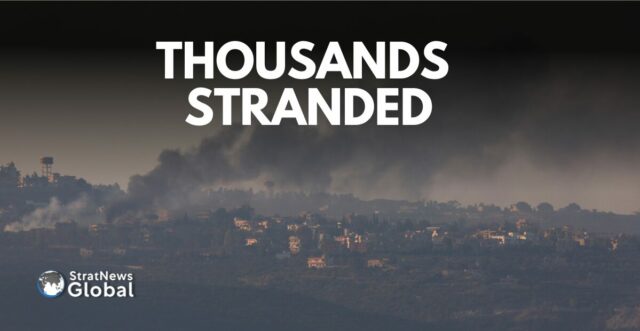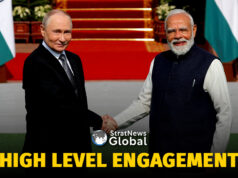An Israeli strike on Friday near Lebanon’s Masnaa border crossing with Syria cut off a road used by hundreds of thousands of people to flee Israeli bombardments in recent days, Lebanon Transport Minister Ali Hamieh told Reuters.
Hamieh said the strike hit inside Lebanese territory near the border crossing, creating a four-metre (12 feet) wide crater.
An Israel Defence Forces (IDF) military spokesman had accused Iran-backed Lebanese armed group Hezbollah on Thursday of using the crossing to transport military equipment into Lebanon.
“The IDF will not allow the smuggling of these weapons and will not hesitate to act if forced to do so, as it has done throughout this war,” IDF spokesman Avichay Adraee said on X.
Escaping Lebanon
According to Lebanese government statistics, more than 300,000 people – a vast majority of them Syrian – had crossed from Lebanon into Syria over the last 10 days to escape escalating Israeli bombardment.
The Israeli military on Friday told the residents of over 20 more southern towns in Lebanon to evacuate immediately, spokesperson Avichay Adraee said on X as Israel pressed ahead with its incursions in the region.
The escalating fighting between Hezbollah and Israel has raised fears that the United States and Iran will be sucked into the Middle East conflict raging on several fronts.
Evacuation Of Foreign Nationals
Nations worldwide have prepared contingency plans to evacuate citizens from Lebanon after a dramatic escalation in the conflict between Israel and the Lebanese armed movement Hezbollah.
Although no country has launched a large-scale military evacuation yet, some are chartering aircraft. People are also fleeing on their own.
U.S. President Joe Biden said he did not believe there is going to be an “all-out war” in the Middle East, as Israel weighs options for retaliation after Tehran’s largest ever assault on its arch-enemy.
However, Biden said more needed to be done to avoid a Middle East war, as Israel’s military hit Beirut with new air strikes in its battle against Lebanese armed group Hezbollah.
Asked by reporters in Washington on Thursday how confident he was that such a war could be averted, Biden said, “How confident are you that it’s not going to rain? Look, I don’t believe there is going to be an all-out war. I think we can avoid it.
“But there is a lot to do yet, a lot to do yet.”
Netanyahu’s Stance
Israeli Prime Minister Benjamin Netanyahu has vowed Iran will pay for Tuesday’s missile attack, and Washington said it would work with its longtime ally to ensure Iran faced “severe consequences.”
Iranian President Masoud Pezeshkian, speaking in Doha, said on Thursday that Tehran would be ready to respond.
“Any type of military attack, terrorist act or crossing our red lines will be met with a decisive response by our armed forces,” he said.
Israel, which has been fighting Hamas in the Palestinian territory of Gaza for almost a year, sent troops into southern Lebanon on Tuesday after two weeks of intense airstrikes in a worsening conflict that has drawn in Iran and risks involving the United States.
Hezbollah’s Claims
Israel says its operations in Lebanon seek to allow tens of thousands of its citizens to return home after Hezbollah bombardments during the Gaza war forced them to evacuate from its north.
More than 1.2 million Lebanese have been displaced by Israeli attacks, and nearly 2,000 people have been killed since the start of the Israeli attacks on Lebanon over the last year, most of them in the past two weeks, Lebanese authorities said.
Hezbollah says it has repelled several land operations by Israeli troops, with measures such as ambushes and direct clashes.
(with inputs from Reuters)





